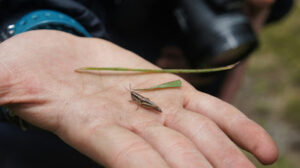
The poet, Mary Oliver, wrote a poem called “The Summer Day.” It begins with a question: who made the world?
Who made the world?
Who made the swan, and the black bear?
Who made the grasshopper?
Big questions for a lazy summer day, I would think, but then it becomes apparent that she is no longer thinking grand thoughts, head in the clouds, because she is distracted by this grasshopper in her hand. Whatever she was thinking about before, she is now completely and utterly engrossed in this singular grasshopper.
the one who has flung herself out of the grass,
the one who is eating sugar out of my hand,
who is moving her jaws back and forth instead of up and down –
who is gazing around with her enormous and complicated eyes.
Now she lifts her pale forearms and thoroughly washes her face.
Now she snaps her wings open and floats away.
In only a few seconds, the writer has noticed, and has told me, more than I ever knew about a grasshopper all my life. She is focused, she is attentive, she is open. Have you ever given this much of your attention to such a small and seemingly insignificant part of God’s creation?
What kinds of things get your time and attention? Where are your treasures?
Every year on Ash Wednesday, we hear these words that Jesus said about practicing your piety, about prayer, fasting, and acts of charity. How do you do what you do, he asks us.
When you give alms, when you fast, when you pray, don’t give yourself a trumpet fanfare and a pat on the back, so others will praise you. Is this the treasure you seek?
What are you seeking? What is it that really matters to you?
People often say that you can always tell what someone cares about by looking at their checkbook. See where they spend their money then you will know what they value. And perhaps many of us would blush in embarrassment if our lives were put under that kind of scrutiny. We find there is so much pressure to have the things one is supposed to have, to do things the way one is supposed to do them. We see commercials on TV for the new model cars, the latest electronic gadgets. We discover ways that we are inadequate that we never knew before, because now we can buy whole-body deodorant, make-up and hair-care products that seem to have been invented for problems we never before knew existed. And so we must buy these things too.
My bathroom cabinet is full of treasures like this, many past their expiration date. And my junk drawer is full of outdated electronics and their chargers – treasures that will be consumed by rust.
What are we seeking? What really matters to us?
If I sat in a meadow on a summer day and found a grasshopper in my palm, would I be able to give it such complete attention for even a second? I would, surely, have a hundred other things I needed to do, had to get to, because others were depending on me. Because I am indispensable. Irreplaceable.
Is that the treasure I choose to store up? The delusion that I am so important? Is this what the Lord wants from me?
The words of Psalm 51 tell us the sacrifice that is acceptable to God is a broken spirit, a broken and contrite heart.
A heart broken open to receive all that God would give to us.
In her poem, Mary Oliver goes on to wonder about prayer.
I don’t know exactly what a prayer is.
I do know how to pay attention, how to fall down
into the grass, how to kneel down in the grass,
how to be idle and blessed, how to stroll through the fields,
which is what I have been doing all day.
Tell me, what else should I have done?
Doesn’t everything die at last, and too soon?
Just as she began, she ends with a question: Tell me, what is it you plan to do with your one wild and precious life?
Rest in the beauty of God’s creation? Experience the wonder of it all? Be still and know God?
During this season of Lent, may you find moments of stillness. May you wonder at the small things, the ephemeral things. May you let your heart be broken open to receive the blessings of God. In these things you will store up treasures that last.
Photo by Mariana Restrepo Londoño on Unsplash
